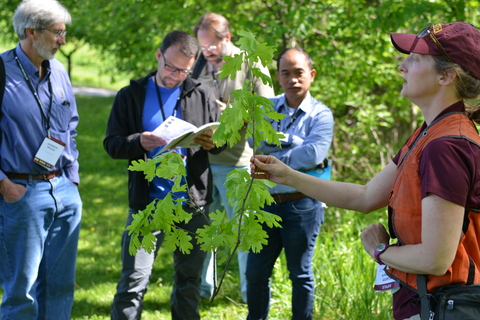Forest pest first detectors are trained to quickly detect and diagnose early infestations of emerald ash borer, spongy moth, Asian longhorned beetle, Japanese barberry, round leaf (Oriental) bittersweet and other pests so that state and federal agencies can control the spread.
Become part of the award-winning Minnesota Forest Pest First Detector volunteer program to help the public find new invasive species affecting Minnesota’s trees and forests, or attend as a refresher for those already active as Forest Pest First Detectors.
This program is a joint venture between Extension, the Minnesota Department of Agriculture and the Minnesota Department of Natural Resources.
How it works
All registrants will complete an online training course to prepare for the in-person workshop. The online course should take approximately 2.5 to 3 hours and should be completed before attending the in-person workshop. The in-person workshop is 7 hours and lunch and refreshments are provided. Both online and in-person workshops are required for successful completion of the program.
What you’ll learn
- Invasive species identification
- Tree disease identification
- Reporting methods
- Common transportation routes for pests
Who should attend
Master Volunteers (Master Naturalist, Master Gardeners, Tree Care Advisors, etc.), tree care professionals, forestry professionals, natural resource professionals, environmental educators, MN Conservation Corps participants, and others. Current Forest Pest First Detector volunteers are welcome but not required to attend.
Volunteer
First Detectors are the front line of defense against likely infestations, and volunteers commit to being available and involved with the program after completing the training. Involvement includes (but isn’t limited to) being accessible to the public for questions, the ability to conduct site visits if necessary, and reporting forest pest-related activities.
If you choose to become a Forest Pest First Detector volunteer you must complete the online course, attend a Forest Pest First Detector workshop, and sign a First Detector confidentially form at the workshop. Be sure to notify your instructor that you want to become a Forest Pest First Detector volunteer. Links to the online course and workshop will appear at the bottom of this page when they are scheduled.
Want to learn about invasive forest pests but unable to commit to volunteering? Everyone is welcome to attend the training, even if you do not wish to become a Forest Pest First Detector volunteer.
Continuing education units (CEUs)
- Master Gardener and Master Naturalist continuing education credits
- MN Tree Inspector Recertification available
- Minnesota Logger Education Program: 6 hours (workshop)
- International Society of Arborists:
- Certified Arborist Science: 8.5 (5.5 for the workshop; 3 for the online course)
- Municipal Specialist: 8.5 (5.5 for the workshop; 3 for the online course)
- Society of American Foresters category 1 CFEs: 8.5 (5.5 for the workshop; 3 for the online course)
Forest Pest First Detector workshops are jointly produced and co-sponsored by the Minnesota Department of Agriculture, Minnesota Department of Natural Resources, and University of Minnesota Extension.
More resources
There are no upcoming events scheduled at this time. See other Natural resources events from Extension.
Reviewed in 2024


